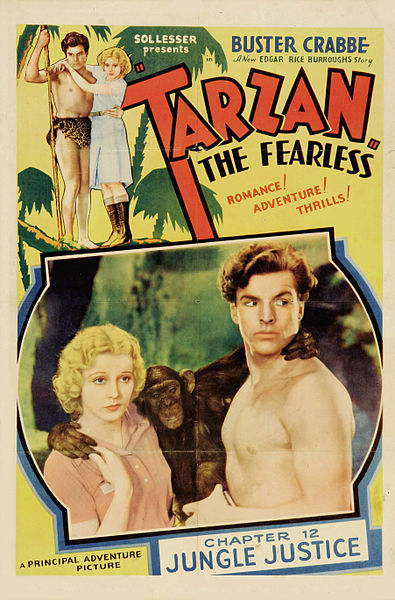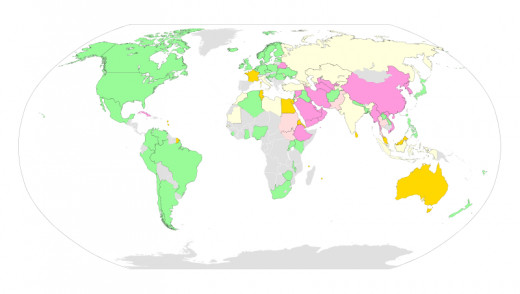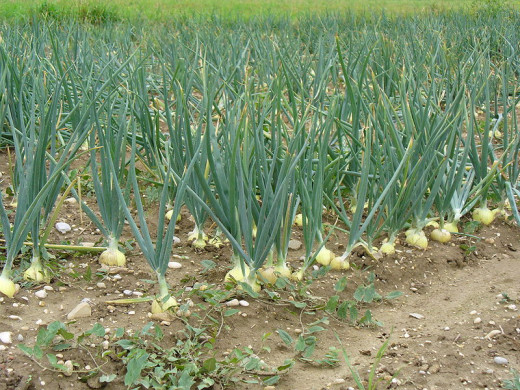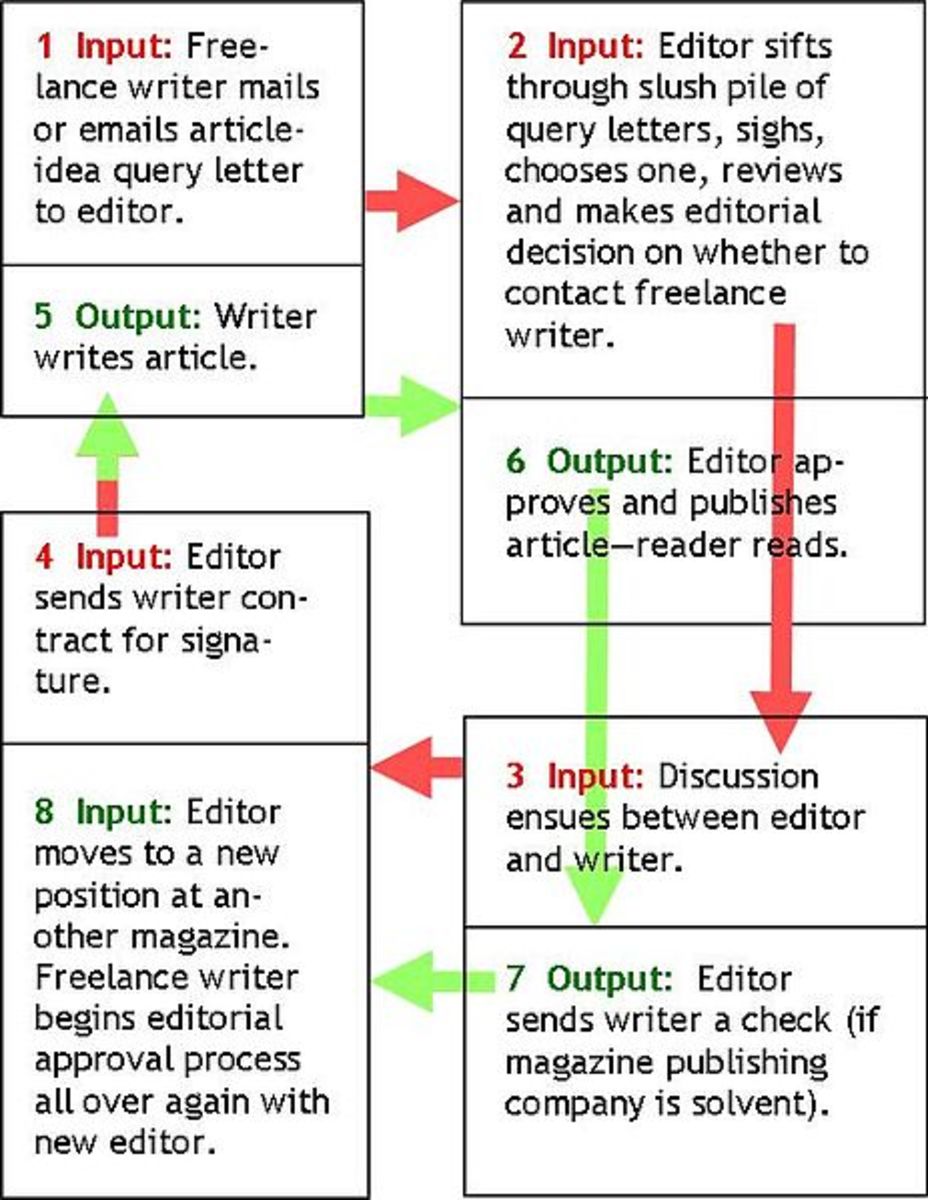What Not to Write About Online!

Jungle Justice.
Imagine yourself as Tarzan or Jane, swinging from vine to vine in the Amazon forest.
As your delicately covered body prepares for the next jump to the vine swing heading in your direction, you notice a traveler in the forest, lost. You are positively exceptional at what you do. You know how to scoop them up and draw them near. It would be a happy ending for everyone. You could still make your vine in time and save the traveler from becoming the next victim of a search by air, land, and sea.
But wait, you decide that instead, you don't want the extra weight hanging off of you. It might cause the covering you are wearing to come loose. Then the clothing would fall off, and you'd be swinging freely with no protection against weather elements such as rain and wind. Plus too, the bugs are thick in this forest. Snakes slither around the trees.
You do the next thing that comes to mind, as you make your jump to the next vine, you use the lost tourist's head as a platform to push off of and gain you more speed. You make your jump and wave goodbye to the person who is now a face planted in the mud.
The fearless writer.
The fearless writer bravely states a point in an article and shares it with the world.
Knowing no bounds except for time, the fearless writer courageously expresses facts and sometimes opinions to allude readers to one desired outcome.
Someone with writing skills knows how to keep readers entertained, enlightened, and projects opinions to emotions such as a movie is projected to a white screen.
Readers are often molded by words, not by facts.
Take for example, a lifelong idea that you are allergic to some antibiotics because your mother told you so since you were very young. "Don't take that because it will make you sick. The last time you took it you broke out in hives."
Every time you reach for the bottle of the alleged allergenic culprit, your mother's words ring true in your mind. They must be true because your mother told you so. Your mother was looking out for your best interests. She must be right.
Yet years later you find yourself defending your stance that you are allergic when asked at a medical facility to list your allergies on an intake form. Your promptly list this ingredient as one in which you must not ever be administered because your mother said so.
The hospital offers you a test. A simple test to determine whether or not you really are allergic. You agree to it to prove once and for all that your mother is right!
However, once the test comes back negative for any allergy, you are given the product in a high dose to cure one ailment which you have been fighting off for years.
You were afraid to take the medicine which you are allergic to according to your mother. So you suffered dreadfully instead of searching out a fact. You either are or are not allergic.
Now faced with the realization that all of this time you didn't have to suffer, and you could have been well on your way to recovery long ago, it brings closure to the point that there are always two sides to every story.
All angles of a story.
A story is based on one person's account, experience or recollection of a particular matter.
Someone may for sure be experiencing a situation in which others have not.
For example, one writer may have had to sell something in order to purchase a first computer. While another writer has four computers and uses them to gain more exposure to their freelance articles.
The first writer may write about what they know. Such as, selling your stuff to buy a first computer. What computers to consider when starting a writing career. How to choose a writing platform for your first writing career.
The second writer might write about the ten most dedicated heroes of all times or how one president got elected multiple times.
The difference between these two writers is the first one is writing about life experiences. The second one is writing about facts.
Both writers are wonderful additions to a group of writers in an online platform.
It takes all kinds of stories to get a group noticed. If everyone wrote about the same thing, there would be minimal interest. But because there is such a diversity in experience and knowledge, it gains an upper hand to the interest of the readers in the general public.
Worldwide Internet.
2005
| 2010
| 2013
| |
|---|---|---|---|
World Population
| 6.5 billion
| 6.9 billion
| 7.1 billion
|
Using the internet
| 16%
| 30%
| 39%
|
Total amount of people using the internet
| 1 billion
| 2 billion
| 2.7 billion
|
United States Census Bureau.
How the internet is changing writing.
Internet writing is changing.
It's no longer a way for people to express their sincere interests in a matter due to experience or personal knowledge.
It's more like the fast-paced approach of a vine swinging in your direction ready for you to reach out and grab it, but knowing full well there is a person on ground level who is looking up to you.
The choice is there. You either help the lost person and bring them to the next vine with you and hope they learn how to jump on their own, or you forget them all together and just go from vine to vine on your own.
The problem with a lot of writing on the internet today is that while it may certainly be based on one's own experiences, there is a lot of untruth that is being told by writers to persuade more readership. It's becoming more like grocery store tabloids than factual articles researched by writers who truly want to help others.
For example, if one person has a favorite coffee and they write about it, anyone can benefit from learning what that person likes or dislikes about that particular coffee. While it's based on opinion, it's still interesting and fun to learn about other people's interests.
But if someone comes along and writes an article to say that coffee is causing cancer in the most Western part of the earth, so there must be something done to save people from their own demise, it might bring quick and easy readership, increasing page views, but where are the factual truths in the article? What is the basis for writing the article except starting trouble for the coffee growers and the people who drink coffee?
I'm being facetious of course and am in no way talking about any one writer in particular here, as I've actually never even read a story promoting coffee bans. I am just suggesting, for a matter of practical illustration, that the latter story is what is filling the internet today, burying the truth below the depths of Google.
Green areas depict little or no censorship.

My search on Google for party items.
Recently, I wrote a Hub containing instructions for crafting a party loot bag for Halloween. While researching information for that Hub, I searched the terms, "goody bags". I was researching how much revenue goody bags bring in a year because I wanted to demonstrate how popular they are for parties. And quite frankly, anyone in the party business might find the article interesting from the standpoint of business sales.
To my surprise, while searching on Google, the first fiew pages were all nonsensical entries about why people have a vehement stance against goody bags.
Goody bags have brought me so many happy memories from my childhood such as going to my friend Amy's house, late of course because I'm always late to the party, and finding a reserved goody bag in my honor loaded with decadent candies!
I was amazed at the people complaining online about goody bags. Most of the articles that I came across were affiliated with some revenue sharing writing site. They weren't personal blogs, reviews or opinions about the popular party accessory. They were actually making money from writing about the negative side of the goody bag. In fact, I had to go back three pages on Google just to find anything well-written at all! This amazed me because party supplies are a multi-billion dollar industry in the United States. So if "follow the money" is true, this instance proved that the money wasn't going to the best party site that day but to the ones spouting off their disdain.
And more importantly, the fact that many of the articles had been copied from one site to another surprised me even more. Not only were negative articles the most popular, they were repeated often by different sites racing for the top spot!
This little exercise demonstrated to me that what brings in the ultimate dollar isn't the most factual, truthful, well-researched or honest article written online. It's the one that gets the most attention.
Freedom to express oneself online.
I whole-heartedly believe in the freedom to self-expression. Meaning that I wouldn't want someone to stifle my inner desire to write about what comes naturally. Life experiences, thoughts, reflection upon dreams and so forth make up a person's character. I would never dream of expecting someone else not to voice their opinions, concerns, complains, laughter, love and desire to share with the world in online writing.
But I find it very baffling what seems to be occurring around us without anyone noticing.
Imagine if newspapers started printing articles about anything with no proof. No researcher was sent out in the field to explore for themselves and to gain knowledge about a situation. The writer just typed up an opinion about onions and why people shouldn't be allowed to eat them in the world because they cause bad breath. So the editor printed the article and it arose to top spot on google. The onion market crashes the next day. Everyone runs for their life in panic mode thinking about how many times they have subjected themselves to the fiery bulbs only to find out after all, they were a health hazard all this time.
Then in an unthinkable act to save it's company, the onion plant decided to fight back! With scientific proof and evidence to support that onions are actually good for our health and to eat more.
The newspaper might have made a few bucks with it's unresearched and biased claims, but assuredly they did not win in the end when onions started sprouting up even more around the fields that the writer ultimately looks out of as he sits and types his apology in the editorial section.

Truth be known.
I get fired up on several occasions.
While I try to maintain my composure, especially online, there are several things in this world that really get under my last nerve.
It's writers who have no basis or fact for what they are deeming truth and presenting it to instill fear and panic in to people who read their writing which serves no purpose other than chasing after the great mighty buck!
And yet, what makes matters worse, are the people who follow them and agree to everything they say, vote, pin, share, etc.
Then it goes viral around the planet until someone writes factual based accounts to discredit and disprove the nonsense. Yet the truth gets very little attention or acknowledgement.
What's there to get fired up about?
Writing isn't just a passion. It isn't just someone's experience. It's about relaying the truth to the public to determine for themselves what they will or will not believe.
If someone is intentionally writing false information to gain readership and to make money, they ultimately destroy the integrity of what true writers are passionate about.
I've read many articles online that get right the core of a matter. They speak truth, honesty, and while I may not agree with every opinion, there's something to be said about a writer who researches facts. When someone shows me writing that speaks to facts, whether or not I agree with what they are saying based on opinion, I respect the writer for a good presentation that allows the reader to make up their own decision.
What I don't think is good writing is that which states untruthful, biased, never documented anywhere claims and then starts making accusations against people who think differently.
For example, when someone writes an article claiming the sun is good for us. But then they go on to say that sitting in the hot sun will never hurt you. In fact it's great to get sunburnt. It enhances the natural pigment in skin. There has never been documented proof that the sun causes cancer or lack of causes the blues. They go on to tell people to make sure their children get at least eight hours of unblocked sun for the maximum benefit of the sun's amazing abilities to nurture skin cells.
Of course this is hypothetical but think about the implications of what this person is saying. They are saying in essence, don't believe the scientists or skin cancer patients who claim to have factual or first-hand knowledge about the damage the sun can cause. Don't wear sunblock. Don't believe that the sun will harm your children. In fact, make sure your children are out in it, without sunblock, and they will reap the benefits of the sun for life!
Reach for the Sun!

Note to self!
Remember, when you are writing online on a platform with other writers, be courteous and professional.
It's okay to disagree with someone's opinion. It's ok to say you found out it worked better a different way when you tried it.
But, is it ever okay to say to someone that their idea isn't correct because only your idea will work?
Being one-sided isn't likely to gain you much support. After all, if it were you being told you are wrong despite learning through trial and error, how would you feel? Would you feel slighted and annoyed that others can't see it your way and only believe they are correct?
Also, remember that if you are writing on a platform, maintaining professionalism is a way to sell yourself to people who are interested in reading what you write!
I like to think that there is always someone out there who I can help.
What not to write about online.
There are guidelines on writing platforms which essentially give you the core ingredients for writing on individual sites. Some ask that writers refrain from religion and politics. Other ask that readers refrain from writing about personal topics.
Having read way more articles than I could ever write, I can tell you what I think it is a proper guideline to writing online.
- Write what you have personal experience with. If you spend time at the beach every weekend and saw what you think is a mermaid, by all means write about it! You were there, you saw it. Hopefully you got a picture. It doesn't matter who thinks they exist or not. The point is, you have actual experience with something.
- Write what you have knowledge about. If you are a bus driver for an inner city school, I want to hear your stories for sure! I bet you have a lot of tales to tell and it would be entertaining, by golly!
- Write about what you have done! What have you done in life? Did you go out every night of the week when you were a teenager only to find yourself a company executive years later? Boy, you certainly do have a lot to share. People want to know how others got to the top.
- Write about what comes naturally. What can you do that others can't? Are you a gymnastics star, did you play the piano in Carnegie Hall, or did you swim the longest distance in the ocean? Share that with the rest of us! Readers love to encourage others.
- Write about what you think is wrong! Do you think GMOs are wrong? Do you think it's wrong to believe in aliens? Do you think it's wrong to own too many cars? Write about it! Chances are there are many people who believe in what you believe and think the way you think.
When you speak to a reader and offer them what they want to hear, you can't go wrong. Just speak the truth!
Likewise, if you were to start an article about mermaids, back it up with facts! You aren't going to convince everyone there are mermaids. But at least you can truthfully account for your experience and provide facts from other sources.
So, what shouldn't writers write about?
Writers shouldn't subject their readers to untruths just to make a buck at the reader's expense! Especially when it is written just to create a problem where one never existed.
For example, there was a true case years ago that I witnessed online in a writing platform. I wasn't writing, but I had a few favorite writers that I followed regularly. A very popular writer had become notorious for her ability to catch criminals in the act. She wrote about the crimes and the punishments for such. On one particular occasion, on her drive home from work, she saw what appeared to be an abandoned property. When she got closer to the driveway, she decided to drive in. She crossed over private property, took some pictures of what looked to be a dilapidated building with live animals living under a makeshift roof from a bunch of wooden boards. The writer immediately drove home to write about the story and to upload her pictures. She never went to the police or animal control. She simply wrote about the story to gain the empathy and compassion of her fierce online following. Pretty soon, people were driving over to the land where an alleged animal cruelty case was unfolding. Police started arresting people who were trespassing on private property. The owner became a public outcast on Facebook after many people shared and liked the writer's unfounded words. The result, the writer was exposed for slander. It's stories like this that cross the line. Did the writer intend for the dominoes to fall after her story went viral? I think she honestly believed she was helping in public interest. But what she actually did was trespass, and unlawfully subject someone to criticism and public scrutiny who had committed no crime.
List of important attributes to a good story.
| Implementing ideas.
|
|---|---|
Be truthful.
| State honest facts that correlate to opinion.
|
Research facts.
| Find out facts before declaring the sun isn't hot enough to burn.
|
Validate sources.
| Understand where information comes from and make sure it's valid.
|
It's ok to express opinion, but express reasoning.
| It's ok to say onions create bad breath, but give reasons why bad breath occurs.
|
Don't write statements that are libelous.
| Don't play in a hornet's nest unless you have poison control on speed dial.
|
How does it make you feel to read something that is totally biased and untruthful?
Conclusion.
Do you want to be like the hypothetical Tarzan and Jane? Indiscriminately swinging around on vines, using everyone else as a kickstand to gain more momentum to what you write?
Of do you sincerely write for an audience that you respect. You don't take them for granted. You carefully craft your writing because you wouldn't dream of planting seeds in the minds of those that truly respect your work and listen to what you say?
When writing online, remember that there are entire continents with no censorship.
While it's great to write and make some money, don't become a fad tomorrow because of what you wrote today.





